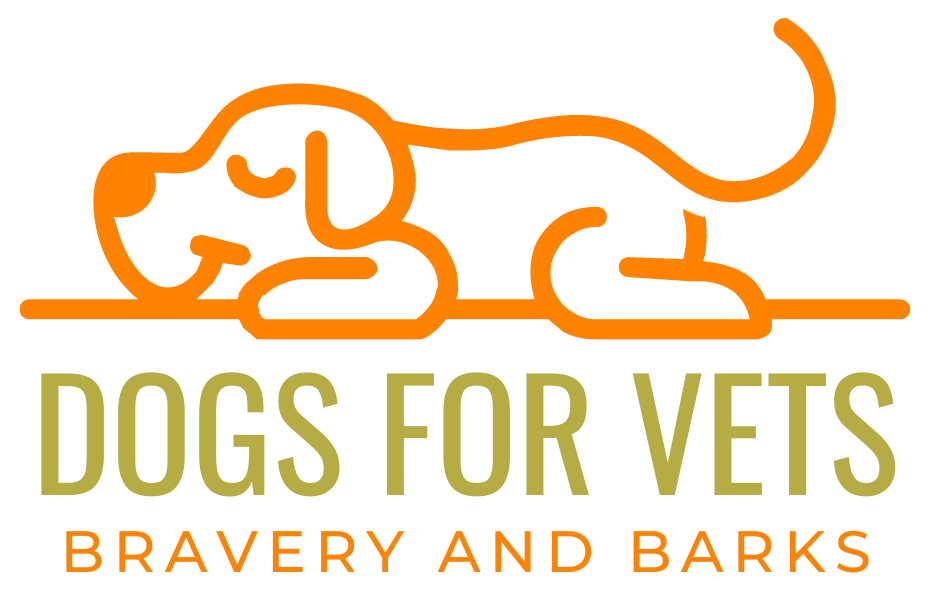This post may contain ads and affiliate links and we may earn a small commission when you click on the links at no additional cost to you. As an Amazon Affiliate, we earn from qualifying purchases. You can read our full disclaimer here.
Poodle vs Golden Retriever: Their Unique Charm and Challenges
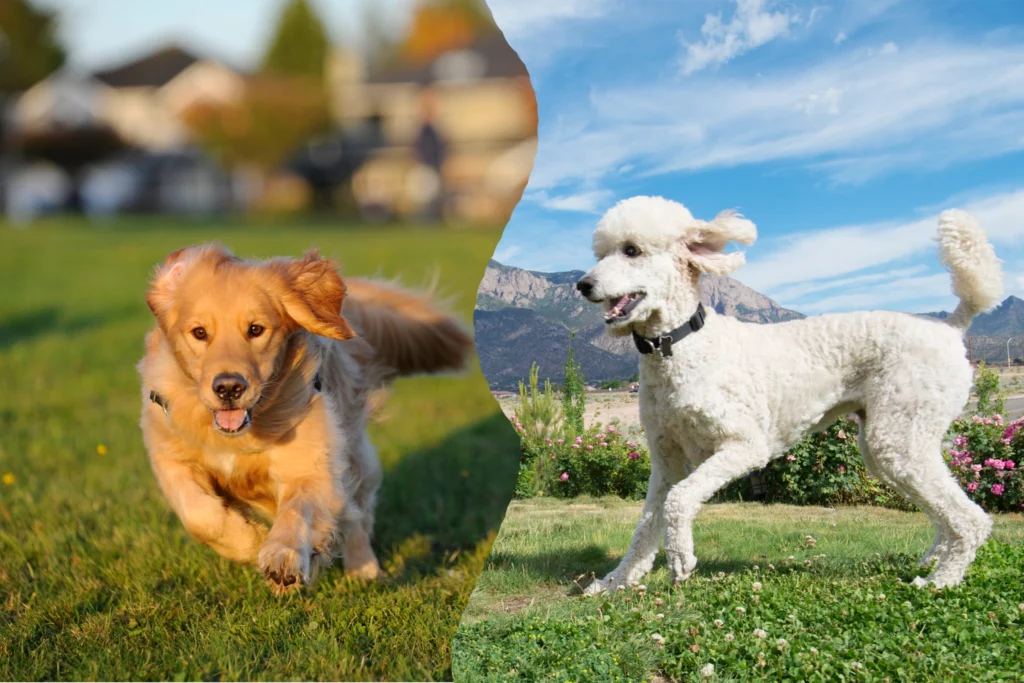
When it comes to the great debate of Poodle vs Golden Retriever, many potential pet owners find themselves at a crossroads.
Both breeds boast unique charms and characteristics that have endeared them to dog lovers worldwide.
Having had the joy of raising my third Golden Retriever and being a proud parent to a playful Goldendoodle, I’ve had my fair share of delightful doggy moments.
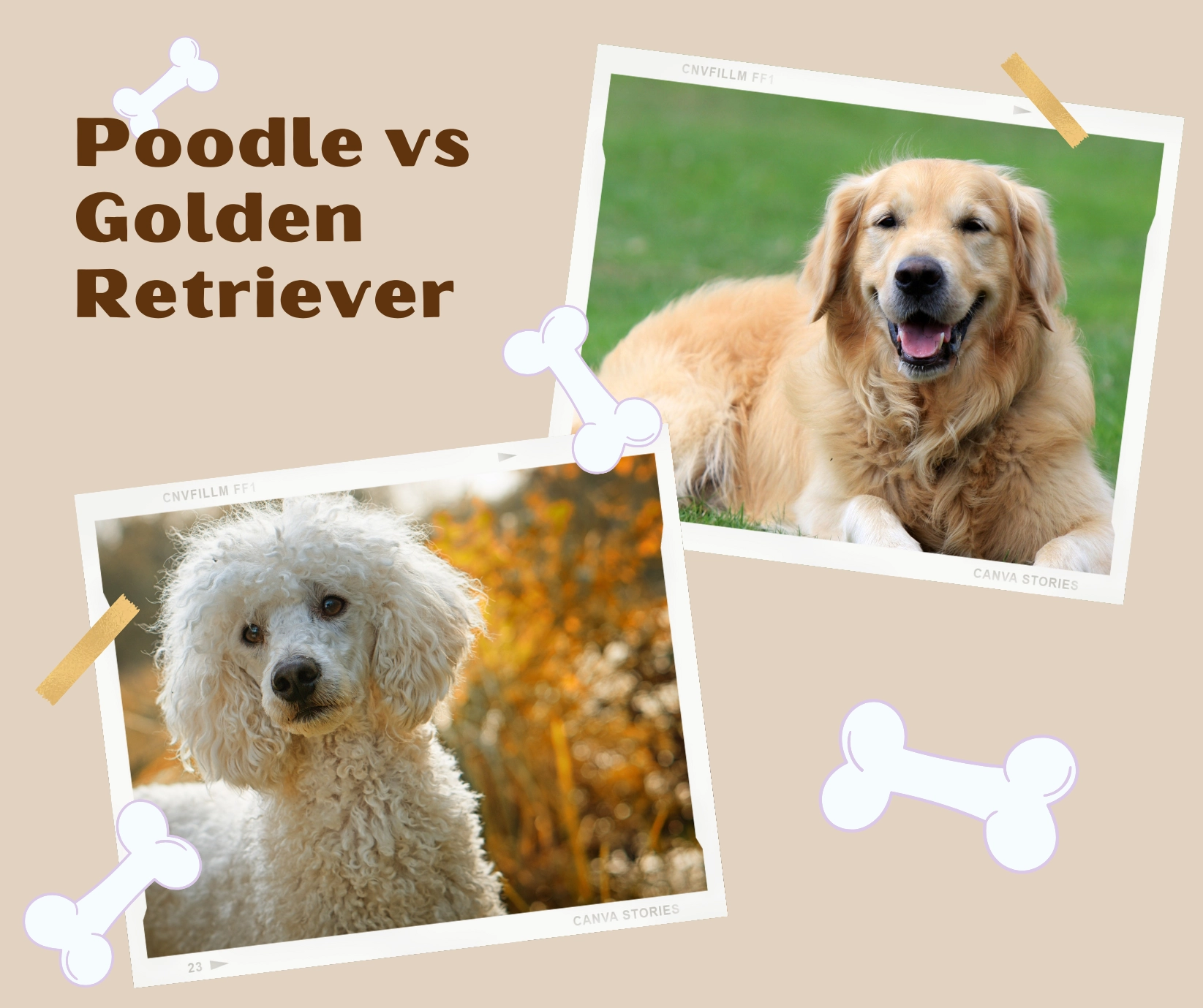
As I contemplate adding a Poodle to my furry family, I’ve dived deep into understanding both breeds.
Grooming Needs: Poodle vs Golden Retriever
In the “Poodle vs Golden Retriever” comparison, grooming emerges as a significant factor to consider. Both breeds have their specific grooming needs. Let’s explore them in depth.
Golden Retriever
Golden Retrievers are celebrated for their luxurious, water-resistant double coats. This characteristic does more than add to their visual appeal; it also brings unique grooming requirements.
Coat Type and Shedding Tendencies
Golden Retrievers boast a protective double coat, perfect for both water adventures and cold climates. Seasonal shedding is common, especially in the spring and fall. During these periods, prepare for an uptick in the amount of fur decorating your living spaces.
Golden Fur Facts:
- Dual-layered coat: soft undercoat with a water-resistant outer layer.
- Shedding peaks during transitional seasons: spring and fall.
- Dense coat offers both insulation and water protection.
Brushing Frequency and Tools Recommended
Maintaining the Golden Retriever’s illustrious coat demands regular brushing. This practice not only mitigates excessive shedding but also promotes a healthy, vibrant coat. Various grooming tools can optimize this process.
Grooming Toolbox Essentials:
- Regular use of a slicker brush.
- A deshedding tool for high-shed seasons.
- Combs for detangling, especially near the ears and tail.
Bathing and Trimming Needs
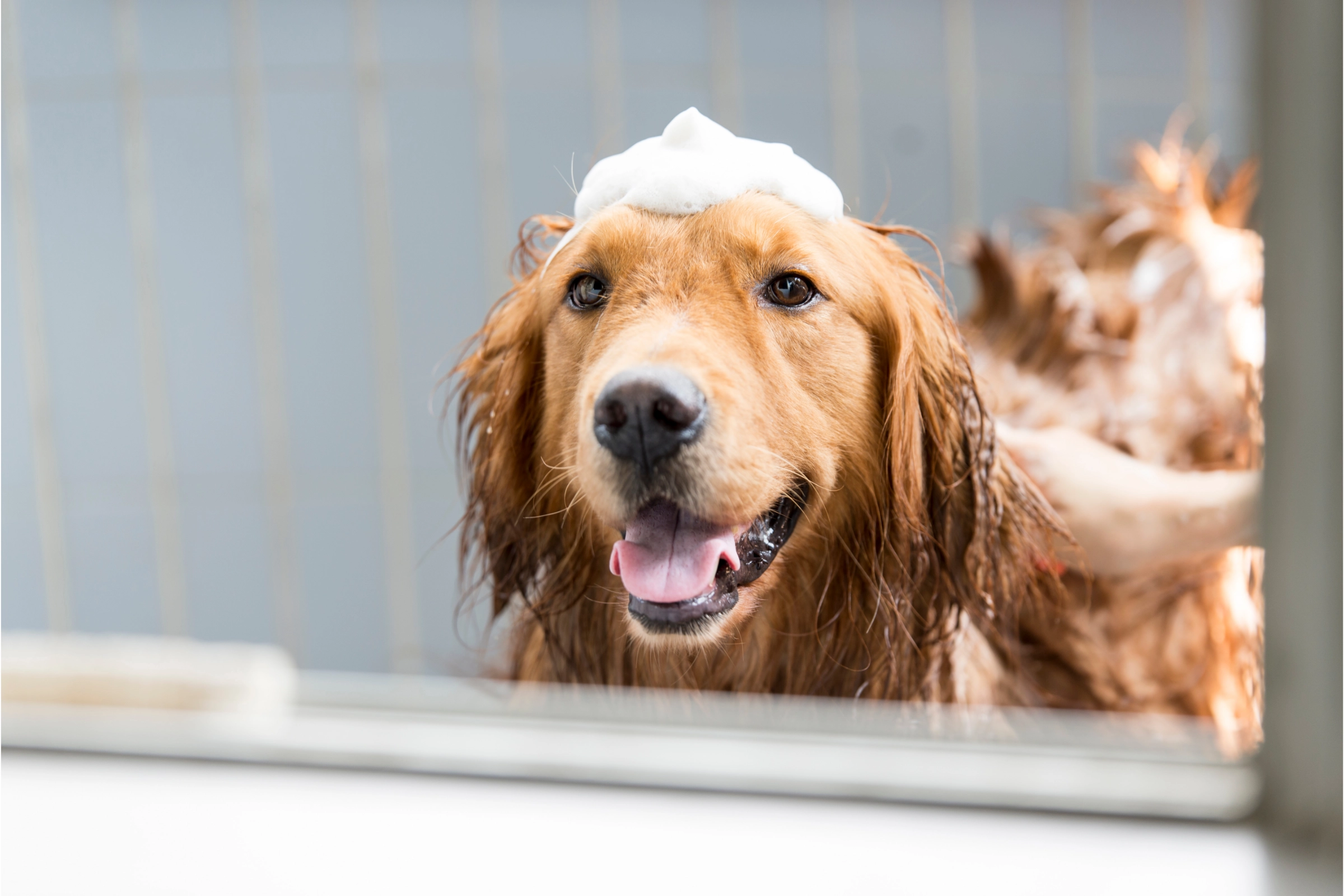
While frequent baths aren’t a must for Golden Retrievers, strategic trimming can enhance their appearance. Ears, paws, and tail regions often require the most attention.
Golden Spa Recommendations:
- Monthly baths, or after messy escapades.
- Focus on trimming areas like ears, paws, and tail.
- Monitor and trim nails to prevent overgrowth.
Poodle
Poodles, with their distinct curly fur, are undeniably attention grabbers. But beneath those curls lies a grooming regimen that is intricate and demanding.
For more great information about poodles, read our article about poodle’s prety drive.
Different Sizes and Their Coat Variations
Poodles parade in three sizes, each with subtle coat differences. But one thing’s constant: the iconic curly, dense fur, which appeals especially to those prone to allergies.
Poodle Size and Shed Spectrum:
- Sizes: Toy, Miniature, and Standard.
- Uniformly curly and dense fur across sizes.
- Shedding is minimal, a bonus for allergy sufferers.
Curly Coat and Its Specific Needs
A Poodle’s curly fur is more than a fashion statement. It has unique grooming needs. The curly texture tends to trap dead hairs, making regular grooming imperative to prevent matting.
Curl Care Tips:
- Regular brushing to prevent mat buildup.
- Every other day grooming is ideal.
- Use specialized brushes, like pin brushes, for effective detangling.
Importance of Regular Grooming to Prevent Matting
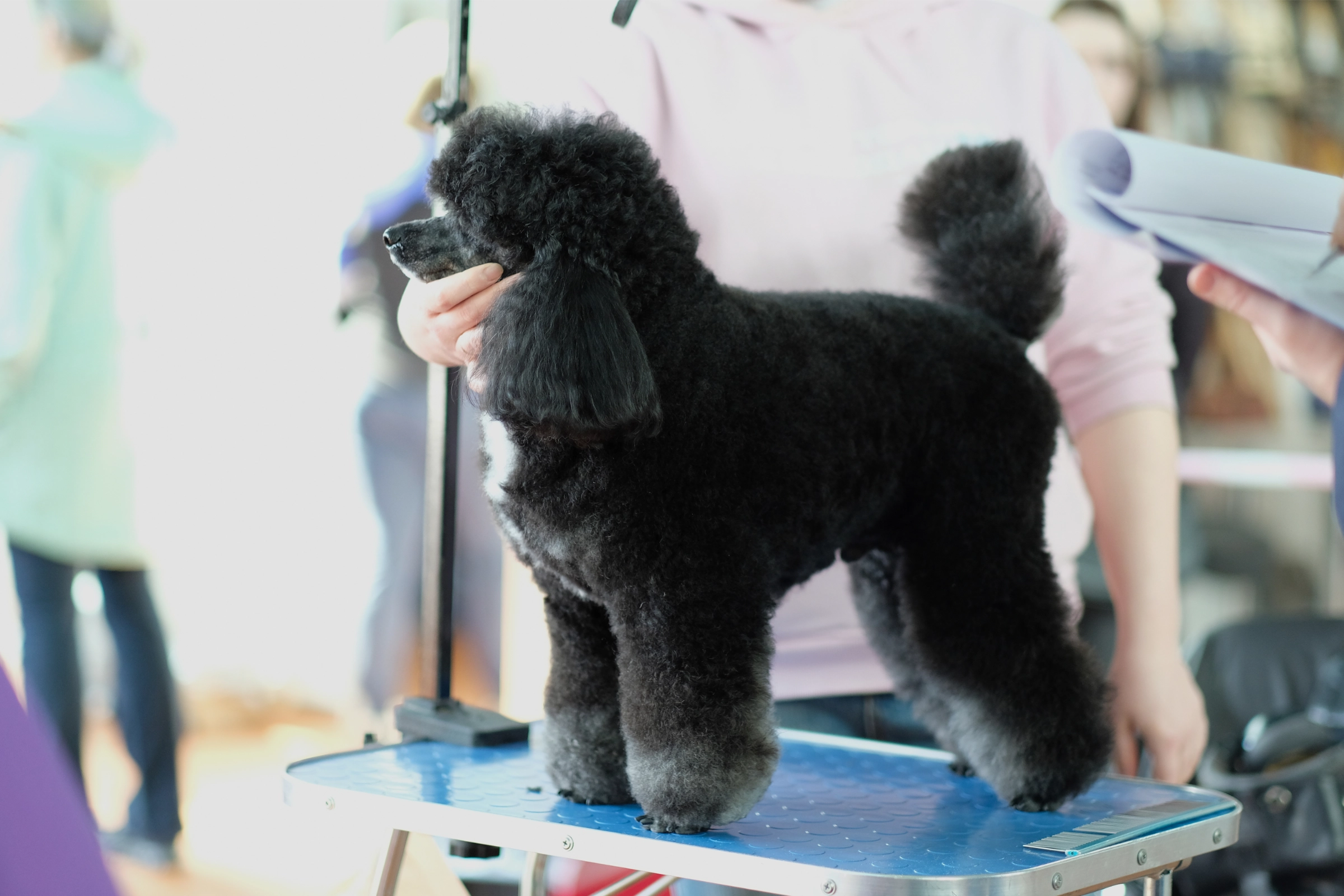
A neglected Poodle coat can lead to uncomfortable matting. Regular grooming sessions tailored to their specific coat type and length are paramount for their comfort and appearance.
Poodle Grooming Principles:
- Avoid matting which can lead to skin complications.
- Schedule grooming every 3-6 weeks based on coat requirements.
- Sessions may encompass washing, cutting, and styling.
Temperaments: Poodle vs Golden Retriever
Deciding between a Poodle and a Golden Retriever requires more than just comparing their looks. It’s crucial to understand their temperaments, especially if you’re trying to find the perfect fit for your home. Both breeds have unique qualities, and diving deep into their behavioral traits will give you a clearer picture.
Golden Retriever
Golden Retrievers are often the poster dogs for friendly canine behavior, and they’ve won hearts globally for good reasons.
Friendly and Sociable Nature
When you think of a Golden Retriever, the first word that likely comes to mind is ‘friendly’. These dogs are social butterflies. Their kind and accepting nature make them eager to befriend everyone, from children to adults, and even other animals. This warmth is why many households adore them.
Golden Retriever’s Social Highlights:
- They almost always exude a cheerful demeanor.
- Rarely display aggressive behavior; more inclined towards befriending than confronting.
- Highly sought after as therapy dogs because of their soothing and comforting nature.
Energy Levels and Exercise Needs
Beneath their calm exterior, Golden Retrievers are bundles of energy. They need a good mix of physical and mental exercises to stay content. Their love for the outdoors means they relish activities like fetch, swimming, or just romping around in a garden.
Golden Retriever’s Activity Checklist:
- Essential to have daily walks, coupled with playtime.
- Participate and often shine in agility courses and obedience trials.
- A spacious yard is a bonus, giving them room to stretch their legs and play.
Compatibility with Families, Kids, and Other Pets
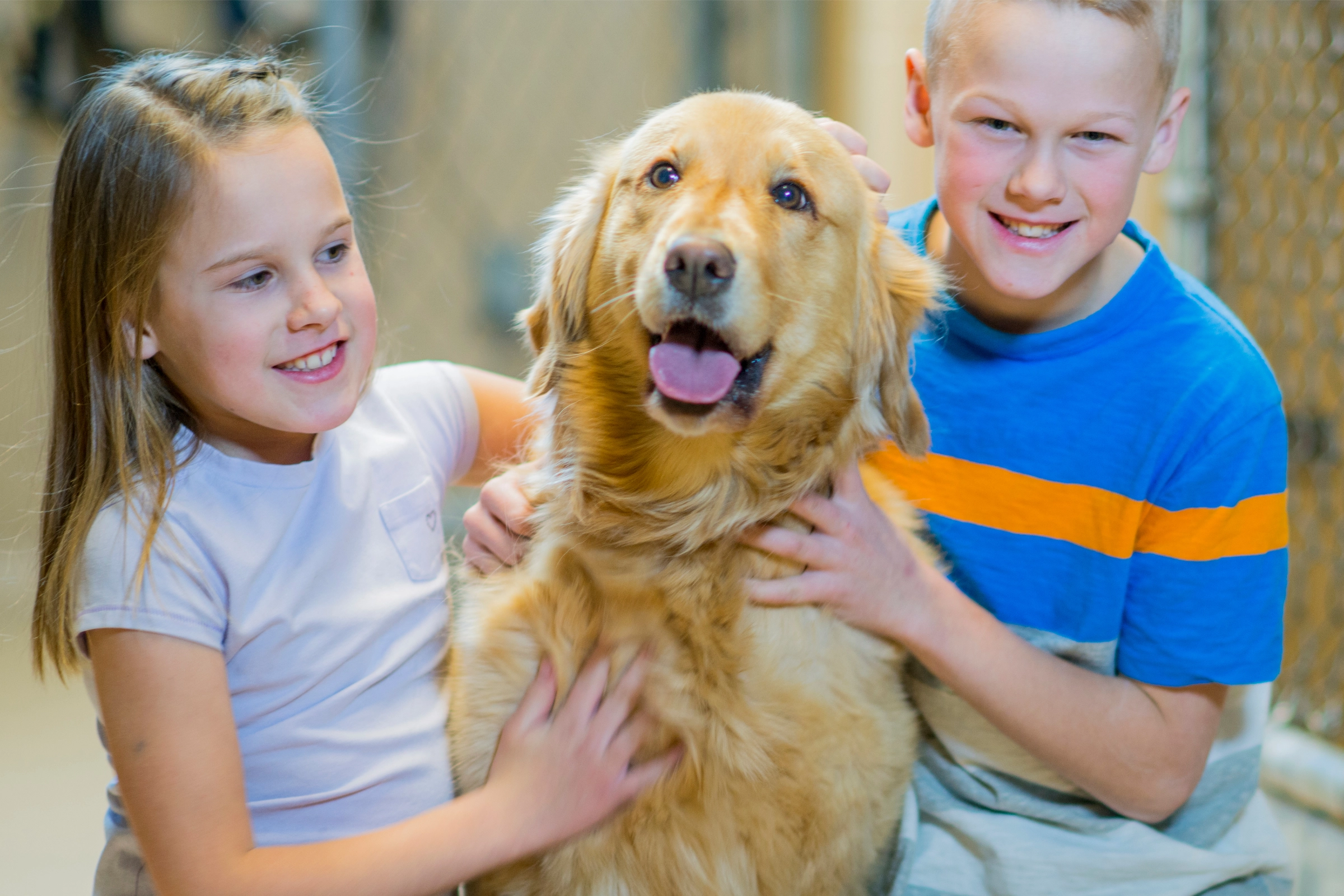
Golden Retrievers seamlessly integrate into family settings. Their tolerant and gentle disposition means they are patient with children and usually coexist peacefully with other pets.
Golden Retriever’s Family Dynamics:
- Renowned for being especially gentle and patient with kids.
- Harmonious relationships with other pets are common.
- Often the center of family activities, enjoying picnics, trips, or just lounging with the family.
Poodle
Poodles, while distinctively elegant in appearance, bring a myriad of traits to the table, making them equally charming.
Intelligent and Alert
Poodles are the thinkers in the canine world. Their intelligence stands out, and they’re quick learners. This makes them easy to train, but it also means they need mental stimulation to prevent boredom.
Poodle’s Intellectual Pursuits:
- Highly trainable, adapting swiftly to new commands.
- Stand out in activities requiring intellect like dog sports or puzzle games.
- Their alertness extends to their surroundings, making them effective watchdogs.
Possible Variations in Temperament Based on Size
While the Poodle breed has core characteristics, the different sizes – Toy, Miniature, and Standard – can exhibit slight variations in temperament.
Poodle Size and Personality Insights:
- Toy Poodles, being smaller, might be more vivacious and spirited.
- Miniature Poodles often merge the traits of Toys and Standards, offering a middle-ground temperament.
- Standard Poodles, while still alert, tend to be more composed and relaxed.
Socialization Needs
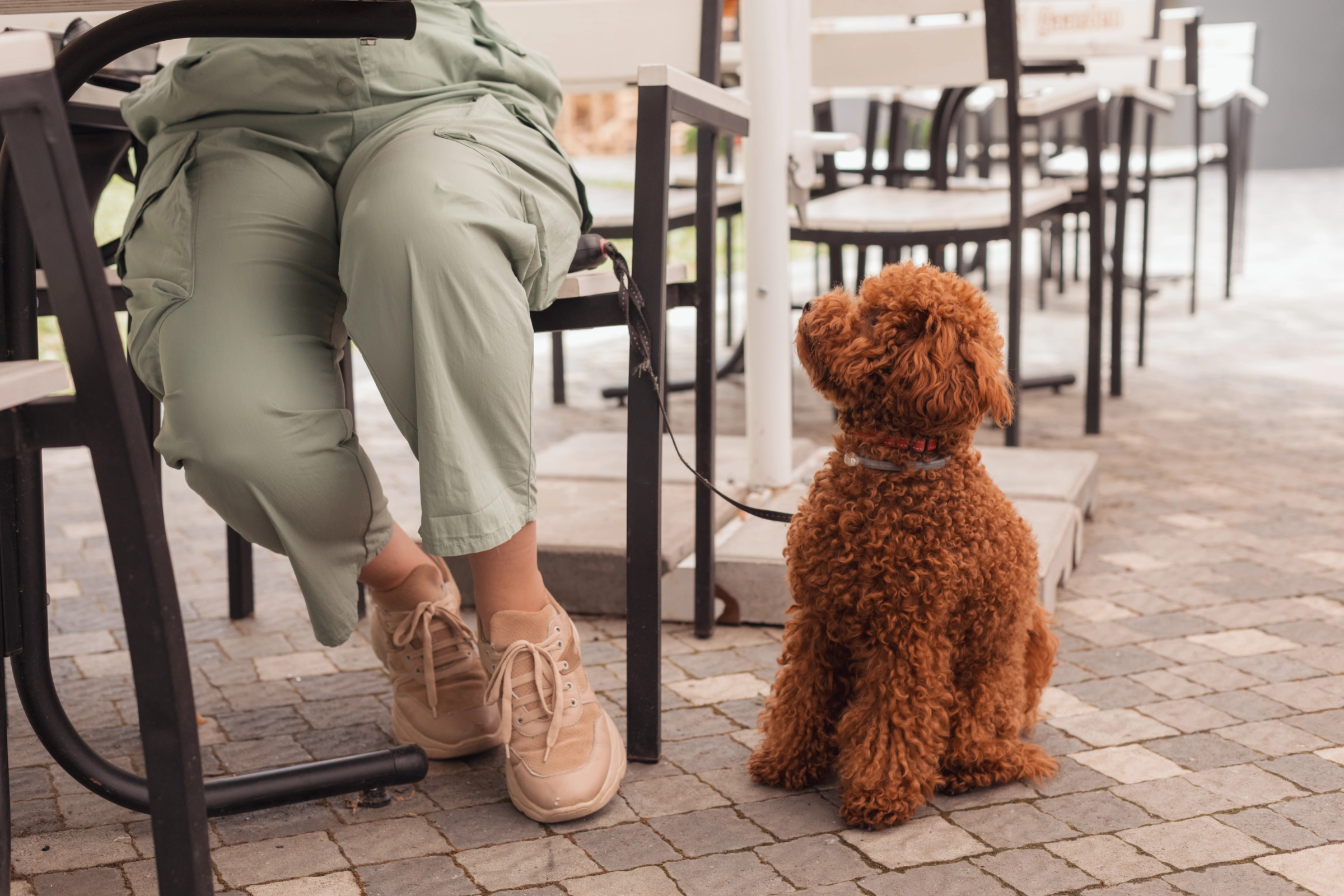
Poodles thrive on social interactions. They’re naturally sociable, but early socialization helps them adjust better to various environments, from crowded places to serene parks.
Poodle’s Social Agenda:
- Crave human interaction, enjoying family time and bonding sessions.
- Early socialization helps in developing a well-rounded temperament.
- Group activities, doggy daycares, or dog park visits are often enjoyed.
By understanding these temperamental nuances, you’ll be better equipped to make an informed choice. Both breeds have an abundance of love to offer; it’s all about finding the right match for your lifestyle.
Health Issues: Poodle vs Golden Retriever
When considering a pet, it’s essential to be informed about potential health concerns. Both Poodles and Golden Retrievers are brilliant breeds, but like all dogs, they come with their set of health considerations. Let’s dive into these to ensure you’re fully equipped to provide the best care.
Golden Retriever
Golden Retrievers, with their gentle demeanor, unfortunately, face several health challenges. Knowing them aids in prevention and early detection.
Common Health Concerns
Golden Retrievers, due to their larger size and genetic factors, are often susceptible to certain ailments. These range from joint issues to some heart conditions, affecting their quality of life.
Golden Retriever’s Health Watchlist:
- Hip Dysplasia: A malformation of the hip joint that can lead to arthritis. Regular exercise and a balanced diet can help manage this condition.
- Elbow Dysplasia: Similar to hip dysplasia but affects the front limbs. Early detection and appropriate treatment can alleviate the pain.
- Heart Conditions: Especially, subvalvular aortic stenosis, a congenital heart defect. Regular vet checks can help monitor heart health.
Lifespan and Influencing Factors
The typical Golden Retriever has a lifespan ranging from 10 to 12 years. However, various factors can influence this, from genetics to care provided.
Golden Retriever’s Lifespan Factors:
- Genetics: Knowing the health history of a pup’s parents can give insights into potential health risks.
- Diet & Exercise: A balanced diet and regular exercise can significantly improve their lifespan.
- Regular Vet Visits: Helps in early detection and management of potential health issues.
Poodle
Poodles, with their refined appearance, also have certain health issues that potential owners should be cognizant of.
Potential Health Concerns
Poodles, irrespective of their size, may be predisposed to specific health issues. These range from joint problems to certain skin and eye conditions.
Poodle’s Health Overview:
- Hip Dysplasia: Like Golden Retrievers, Poodles can suffer from this joint issue. Ensuring they aren’t overweight and have regular exercise can help.
- Eye Disorders: Issues like progressive retinal atrophy can affect Poodles. Regular eye check-ups are crucial.
- Sebaceous Adenitis: A skin condition that affects the sebaceous glands of Poodles. Regular grooming and vet checks can help manage this condition.
Regular Vet Check-ups and Early Detection
One of the pillars of maintaining a Poodle’s health is ensuring they get regular vet visits. Early detection can mean the difference between a manageable condition and a severe one.
Poodle’s Health Maintenance Tips:
- Consistent Vet Visits: At least once a year, more if there are existing health concerns.
- Early Detection: If you notice changes in behavior, appetite, or physical appearance, it’s best to consult a vet.
- Vaccinations & Preventatives: Keeping up with their shots and preventatives can ward off a myriad of diseases.
While both breeds are wonderful companions, understanding and being prepared for their health challenges ensures a happier, longer life for your furry friend.
Care Requirements: Poodle vs Golden Retriever
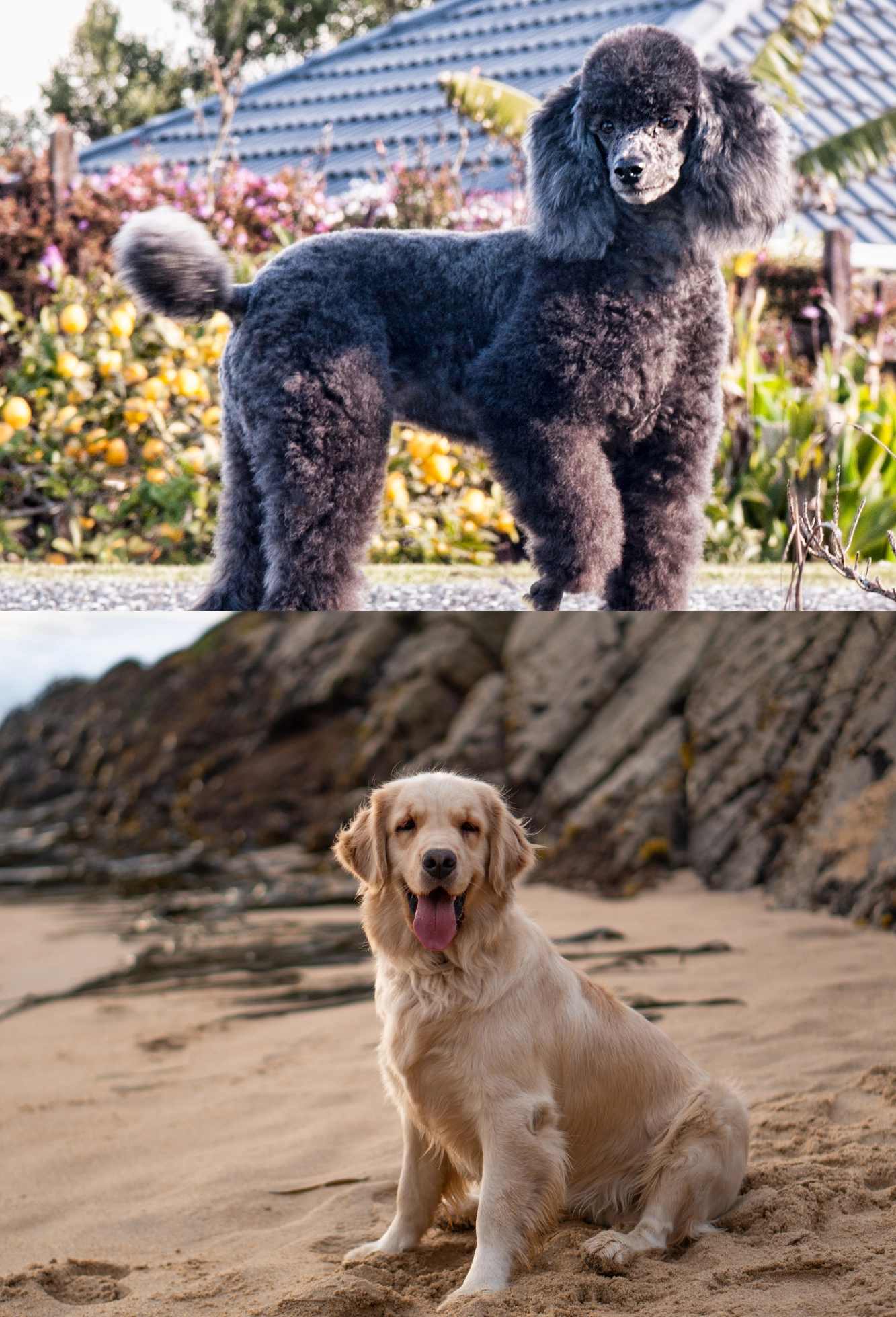
Caring for a dog goes beyond just providing shelter and food. It’s a commitment to ensuring they have a quality life filled with love, stimulation, and proper health practices.
With the Poodle and Golden Retriever each bringing their unique traits, it’s essential to understand their specific care requirements.
Golden Retriever
Golden Retrievers are more than just fetching enthusiasts; they have particular care needs to keep them at their happiest and healthiest.
Dietary Needs and Considerations
What goes into a Golden Retriever significantly affects their overall health. A balanced diet is crucial to keep them fit and free from potential health issues.
Golden Retriever Diet Essentials:
- Protein-rich Diet: Helps in muscle development and maintenance. Sources include chicken, beef, and fish.
- Healthy Fats: Essential for skin and coat health. Look for omega-3 and omega-6 fatty acids in their food.
- Avoid Overfeeding: They can gain weight quickly, so it’s vital to monitor their portions and avoid excessive treats.
Exercise Routines: Walks, Playtime, and Mental Stimulation
Golden Retrievers have bundles of energy that need appropriate outlets. Regular physical and mental exercises keep them content.
Golden Retriever Exercise Regimen:
- Daily Walks: Essential to keep them physically fit and mentally stimulated.
- Playtime: Activities like fetch, tug-of-war, and swimming are favorites.
- Mental Exercises: Puzzle toys, hide-and-seek, and agility courses challenge their intellect.
Training Requirements and Their Eagerness to Please
Goldens are known for their willingness to please, which reflects in their training sessions.
Golden Retriever Training Tips:
- Start Early: Puppy training sessions help in molding their behavior.
- Consistent Commands: Helps them recognize and follow instructions better.
- Positive Reinforcement: Rewards-based training yields better results with them.
Poodle
The Poodle, with its intellectual demeanor, requires care that stimulates both its body and mind.
Nutritional Requirements and Potential Diet Variations Based on Size
Each Poodle size might have specific dietary needs. Recognizing these ensures they receive the right nutrition.
Poodle Diet Insights:
- High-Quality Protein: Vital for muscle health. Adjust quantities based on the size of the Poodle.
- Varying Caloric Needs: A Toy Poodle will have different caloric requirements than a Standard Poodle.
- Essential Fatty Acids: Important for maintaining their curly coat’s health.
Importance of Mental Stimulation Due to Their Intelligence
Poodles are thinkers. They need tasks that challenge their intellect to keep boredom at bay.
Poodle’s Brain Boosters:
- Puzzle Toys: Challenging their minds and rewarding them simultaneously.
- Teaching New Tricks: Their intelligence means they pick up new commands quickly.
- Interactive Games: Like fetch with a twist or hide-and-find treats.
Training Nuances and Potential Challenges
Training a Poodle can be a joy due to their intelligence, but they do come with their quirks.
Poodle Training Pointers:
- Consistency is Key: They’re quick learners, but mixed signals can confuse them.
- Engage Their Minds: Training sessions that also challenge their intellect can be more productive.
- Beware of Stubborn Streaks: Sometimes, especially with Toys and Miniatures, a slight stubborn side might show. Patience and persistence help.
With the right care, tailored to their specific needs, both Poodles and Golden Retrievers can flourish, bringing joy and companionship to any household.
Wrapping it Up: Poodle vs Golden Retriever
Choosing between a Poodle and a Golden Retriever isn’t just about picking a breed based on appearance or popularity. It’s about understanding their unique needs, temperaments, and health considerations.
Both breeds are wonderful in their own right, offering loyalty, companionship, and countless memorable moments.
Golden Retrievers, with their sunny disposition and eagerness to please, are often perfect for families and those looking for an active, loving companion.
Poodles, on the other hand, bring a touch of elegance combined with sharp intelligence, making them suitable for those who enjoy a dog that’s both physically and mentally engaging.
In the end, the decision comes down to personal preferences and the kind of relationship you wish to have with your furry friend.
Whether you opt for the playful exuberance of a Golden or the sophisticated charm of a Poodle, you’re in for a journey filled with love, laughter, and some fur here and there.
Whichever you choose, the bond formed is sure to be one of life’s most cherished.
-
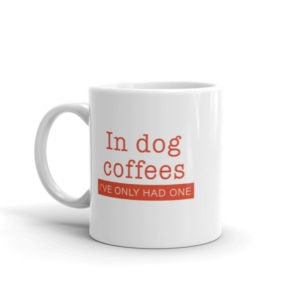
Coffee Mug – In Dog Coffees I’ve Only Had One
Price range: $11.95 through $14.95 Select options This product has multiple variants. The options may be chosen on the product page
